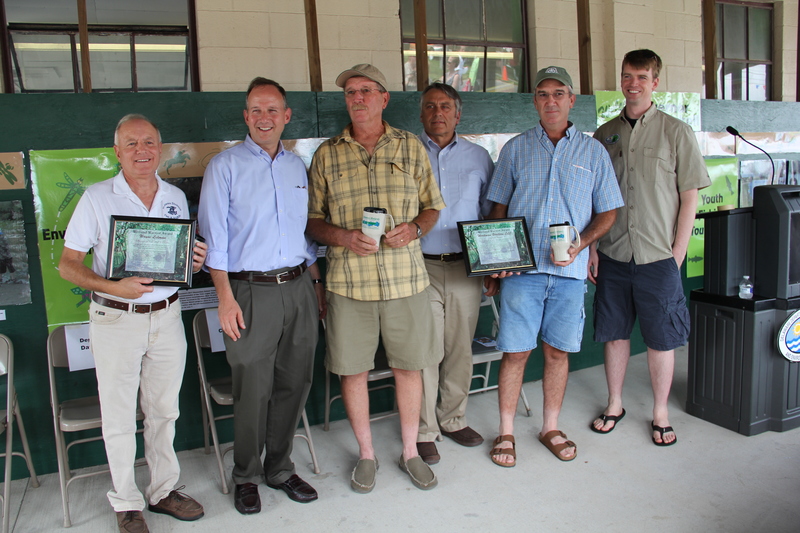DNREC honors Georgetown farming brothers, longtime conservation professional as 2011 Wetland Warriors
Gov. Jack Markell and Department of Natural Resources and Environmental Control Secretary Collin O’Mara honored three men July 28 on the grounds of the Delaware State Fair for their efforts on behalf of conserving and restoring Delaware wetlands.
“Wetlands contribute to the quality of life in Delaware by providing storage for floodwaters and protecting us from coastal storms, providing habitat for wildlife species, and purifying water by removing pollutants and nutrients from runoff. Efforts to protect and restore wetlands are critical to enable the continuation of the economically valuable services provided by wetlands,” said O’Mara. “We are proud to recognize this year’s Wetland Warriors for their important contributions to our state.”
The Wetland Warrior Award, now in its fourth year, is presented annually to a citizen, organization, business or other group that has demonstrated exemplary efforts to benefit Delaware wetlands in the areas of outreach and education, monitoring and assessment, or restoration and protection. This year, three men are being honored as the 2011 Wetland Warriors.
Landowner brothers Mark and Charles Workman are fourth-generation Sussex County farmers who operate almost 3,000 acres of cropland, with corn, soybeans and wheat as their primary crops. In 2010, they restored 26 acres of forested wetlands on their farm near Georgetown through the U.S. Department of Agriculture’s Wetland Reserve Program. The hydrology restoration of the woodland complemented the existing shallow-water area for wildlife they had installed with assistance from Partners for Fish and Wildlife, and 11 acres of native warm-season grasses installed through the USDA’s Conservation Reserve Program. The Workmans are planning to install several additional shallow-water areas for wildlife this year on the same farm through the CRP.
When the Workman brothers first applied to the WRP in 2007, they had already begun to adopt conservation practices for their farming operation, noted Jayme Arthurs, Wetland Reserve Program manager with the USDA. “Mark and Charles Workman balance crop production with conservation practices, and they regularly do both in concert with each other,” said Arthurs, who nominated the Workmans for the Wetland Warrior Award because as farmers, hunters and avid outdoorsmen, they enjoy and support wildlife habitat as an ongoing commitment.
“Mark and Charles Workman’s volunteer participation in restoration programs available to landowners is a superb example of citizens making a difference. In Delaware, forested wetlands are the most vulnerable to loss due to conversion to other land uses. The work they have conducted on their property will benefit wildlife, water quality and flood control while providing carbon storage helping to mitigate climate change,” said Rebecca Rothweiler, DNREC Wetlands Team.
To the Workmans, protecting and conserving natural resources simply goes hand-in-hand with their lives and livelihood. “We’re outdoors people, and we care about wildlife and we care about the bay, and we like to hunt and fish and eat crabs,” said Mark Workman.
Ecologist Wayne Lehman of Dover is an accomplished conservation professional who has championed a number of wetland restoration projects throughout Kent County, where he is a regional wildlife manager with the DNREC Division of Fish and Wildlife. Since 1992, Lehman has led projects that created 170 acres of shallow-water wetland areas distributed throughout several wildlife management areas under his supervision: Blackiston, Norman G. Wilder, Ted Harvey, Milford Neck, Little Creek, Woodland Beach and the Fortney and Urban Tract. These wetlands provide critical habitat to a variety of wetland wildlife species, many of which are listed as species of conservation concern. At Blackiston Wildlife Area near Clayton, for example, Lehman was instrumental in working with a number of partners to create and restore freshwater wetland complexes on marginal agricultural lands. These restored wetlands help control nutrient runoff and improve water quality in a watershed that flows into the Chesapeake Bay.
“Wayne has an easygoing and nonconfrontational style about him that has served both him and DNREC well when explaining to landowners the benefits of his wetland restoration work. As a landowner in this area, I have benefited from these projects and Wayne's technical assistance. He is both a warrior and ambassador for wetland protection, education and restoration in Delaware,” said Andy Manus of Lehman’s nomination.
“It’s really rewarding to take poorly drained, marginal farmland that doesn’t produce crops well and doesn’t really provide anything for wildlife and create areas that are highly diverse in wildlife,” Lehman said of his work. “These areas also make a valuable contribution to improved water quality for the watersheds that link to the Delaware and Chesapeake bays.”
Next year’s call for nominations will be posted next spring on the Delaware Wetlands website, www.dnrec.delaware.gov/Admin/DelawareWetlands.
















































